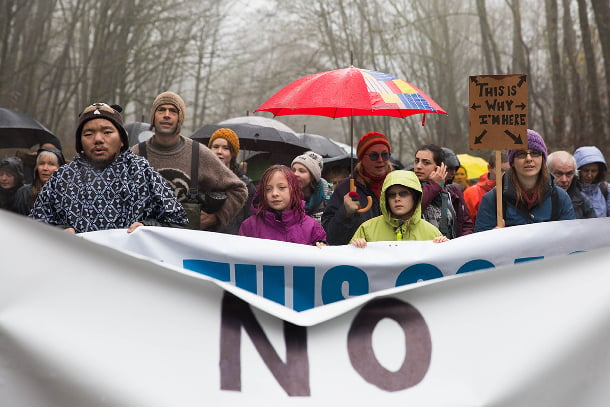At over 60 pages, Bill C-51 -- the Anti-Terrorism Act -- is a heavy read. The bill proposes a myriad of radical changes to Canadian law and to Canada's national security apparatus, many of which seriously jeopardize the rights and freedoms of Canadians while promising little improvement to public safety.
Canada's privacy commissioner, ex-CSIS officials, former prime ministers and international whistleblower Edward Snowden have all raised alarm about the bill's impacts on Canadians' freedom and privacy. Lawyers at the B.C. Civil Liberties Association have gone over the bill paragraph by paragraph, and we've outlined the parts of this document that concern us most.
1. Bill C-51 drastically expands the definition of 'security.'
When you think of being secure, you likely think of being safe from physical danger. But Bill C-51 defines security as not only safeguarding public safety, but also preventing interference with various aspects of public life or "the economic or financial stability of Canada." With this definition, a separatist demonstration in Quebec that fails to get a proper permit, a peaceful logging blockade by First Nations, or environmentalists obstructing a pipeline route could all be seen as threats to national security.
2. It gives the government too much discretion to pick and choose which individuals and groups to target for further scrutiny.
Bill C-51 gives the government the ability to designate an extraordinarily broad range of activities as potential security threats. The government claims it will use good judgment when deciding which individuals and groups constitute true threats. Whether or not a group is deemed a national security threat may hinge on whether their cause is politically popular or in line with the views of the government.
3. It will severely chill freedom of expression.
It's unclear even to experts exactly what kinds of speech and protest activity may be considered threats to national security if the bill passes; the average Canadian has little hope of feeling confident that their legitimate political activity hasn't inadvertently crossed the line. Bill C-51's expansive language means many Canadians will likely choose not to express themselves -- even in completely legal ways -- rather than risk prosecution. Legitimate speech will be chilled, and our democracy will be worse off for it.
4. It will allow government institutions like Health Canada and the Canada Revenue Agency to share information about you with the RCMP.
The proposed Security of Canada Information Sharing Act (part of Bill C-51) would allow government institutions -- including non-security-related institutions like Health Canada and the Canada Revenue Agency -- to share information amongst themselves without a warrant if they believe the information may be relevant to national security.
Given that no one wants to be seen as responsible in case of a security breach, the default will be to share as much information as possible. Massive information sharing does not mean better security. Not only does this jeopardize the privacy of the individuals whose information is being shared, but it may actually make it harder for investigators to detect real security threats: when looking for a needle in a haystack, it hardly helps to add more hay.
5. Canada already has a troubling regime of preventative arrest and detention; Bill C-51 proposes to make it even worse.
Currently the Criminal Code permits the police to arrest, detain and impose restrictions (such as a curfew or travel ban) on someone who has never been (and may never be) charged with a crime if they have good reasons to believe a terrorist activity will be carried out if these actions aren't taken. Bill C-51 would lower the threshold for these actions to situations where the police believe that a terrorist activity might be carried out. It also doubles the amount of time an individual can be detained without charge. Innocent people could be arrested and detained on mere suspicion of future dangerousness.
6. It would give CSIS the power to act like a police force, while still allowing it to operate secretly as an intelligence gathering service.
Bill C-51 would radically redefine the role of CSIS to include the ability to act on -- rather than merely to collect -- security intelligence. This ignores the lessons of history. The 1960s and 1970s saw serious rights abuses undertaken by the RCMP under its "security intelligence" mandate. CSIS was created in the 1980s for the express purpose of separating Canada's intelligence agency from its police force.
As an intelligence agency, CSIS is permitted to conduct much of its work in secret, and the details of most of its activities are never revealed publicly. But that's precisely why CSIS should not be permitted to also operate as a police force: this secrecy means that rights violations by CSIS are more difficult to detect -- and once detected, more difficult to remedy -- than if they were the result of actions undertaken by law enforcement agencies. ![]()
Read more: Rights + Justice, Federal Politics
















Tyee Commenting Guidelines
Comments that violate guidelines risk being deleted, and violations may result in a temporary or permanent user ban. Maintain the spirit of good conversation to stay in the discussion.
*Please note The Tyee is not a forum for spreading misinformation about COVID-19, denying its existence or minimizing its risk to public health.
Do:
Do not: